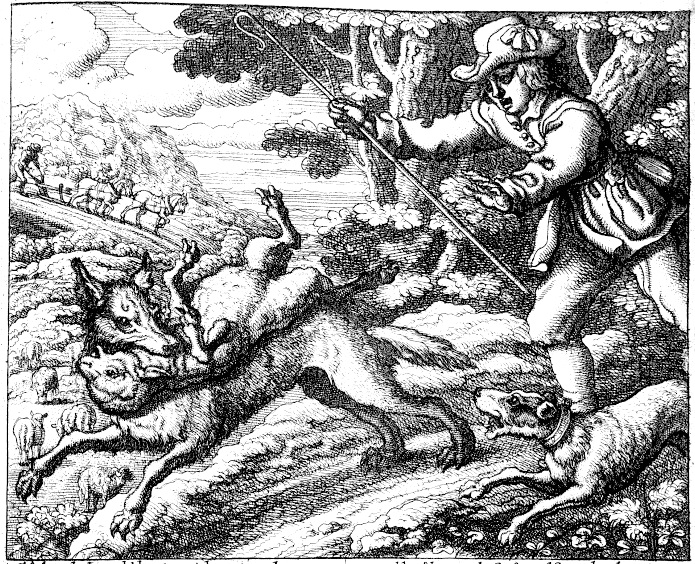The Boy Who Cried Wolf on:
[Wikipedia]
[Google]
[Amazon]
 The Boy Who Cried Wolf is one of
The Boy Who Cried Wolf is one of
available on Google Books, p. 263
/ref>
book illustrations of the fable
{{DEFAULTSORT:Boy Who Cried Wolf, The Aesop's Fables English-language idioms Fictional shepherds Fictional wolves Wolves in folklore, religion and mythology Big Bad Wolf Metaphors referring to wolves ATU 1200-1349
 The Boy Who Cried Wolf is one of
The Boy Who Cried Wolf is one of Aesop's Fables
Aesop's Fables, or the Aesopica, is a collection of fables credited to Aesop, a slave and storyteller believed to have lived in ancient Greece between 620 and 564 BCE. Of diverse origins, the stories associated with his name have descended t ...
, numbered 210 in the Perry Index. From it is derived the English idiom "to cry wolf", defined as "to give a false alarm" in e''Brewer's Dictionary of Phrase and Fable'' and glossed by the ''Oxford English Dictionary'' as meaning to make false claims, with the result that subsequent true claims are disbelieved.
The fable
The tale concerns a shepherd boy who repeatedly fools villagers into thinking a wolf is attacking his town's flock. When an actual wolf appears and the boy calls for help, the villagers believe that it is another false alarm, and the sheep are eaten by the wolf. In a later English-language poetic version of the fable, the wolf also eats the boy. This happens in ''Fables for '' (1830) byJohn Hookham Frere
John Hookham Frere (21 May 1769 – 7 January 1846) was an English diplomat and author.
Early life
Frere was born in London. His father, John Frere, a member of a Suffolk family, had been educated at Caius College, Cambridge, and became ...
, in William Ellery Leonard
William Ellery Leonard (January 25, 1876, in Plainfield, New Jersey – May 2, 1944, in Madison, Wisconsin) was an American poet, playwright, translator, and literary scholar.
Early life
William Ellery Channing Leonard was born on the family h ...
's ''Aesop & Hyssop'' (1912), and in Louis Untermeyer
Louis Untermeyer (October 1, 1885 – December 18, 1977) was an American poet, anthologist, critic, and editor. He was appointed the fourteenth Consultant in Poetry to the Library of Congress in 1961.
Life and career
Untermeyer was born in New Y ...
's 1965 poem.
The moral stated at the end of the Greek version is, "this shows how liars are rewarded: even if they tell the truth, no one believes them". It echoes a statement attributed to Aristotle
Aristotle (; grc-gre, Ἀριστοτέλης ''Aristotélēs'', ; 384–322 BC) was a Greek philosopher and polymath during the Classical Greece, Classical period in Ancient Greece. Taught by Plato, he was the founder of the Peripatet ...
by Diogenes Laërtius
Diogenes Laërtius ( ; grc-gre, Διογένης Λαέρτιος, ; ) was a biographer of the Greek philosophers. Nothing is definitively known about his life, but his surviving ''Lives and Opinions of Eminent Philosophers'' is a principal sour ...
in his ''The Lives and Opinions of Eminent Philosophers'', in which the sage was asked what those who tell lies gain by it and he answered "that when they speak truth they are not believed". William Caxton similarly closes his version with the remark that "".
History
The story dates from Classical times, but, since it was recorded only in Greek and not translated into Latin until the 15th century, it only began to gain currency after it appeared inHeinrich Steinhöwel
Heinrich Steinhöwel (also ''Steinhäuel'' or ''Steinheil''; 1412 – 1482) was a Swabian author, humanist, and translator who was much inspired by the Italian Renaissance. His translations of medical treatises and fiction were an important c ...
's collection of the fables and so spread through the rest of Europe. For this reason, there was no agreed title for the story. Caxton titles it "" (1484), Hieronymus Osius "The boy who lied" ("", 1574), Francis Barlow "Of the herd boy and the farmers" ("", 1687), Roger L'Estrange "A boy and false alarms" (1692), and George Fyler Townsend "The shepherd boy and the wolf" (1867). It was under the final title that Edward Hughes set it as the first of ten ''Songs from Aesop's Fables'' for children's voices and piano, in a poetic version by Peter Westmore (1965).
Teachers have used the fable as a cautionary tale about telling the truth, but an educational experiment in the first decade of the 21st century suggested that reading "The Boy Who Cried Wolf" increased children's likelihood of lying; reading about George Washington and the cherry tree, however, decreased this likelihood dramatically. The suggestibility and favourable outcome of the behaviour described, therefore, seems the key to moral instruction of the young. However, when dealing with the moral behaviour of adults, Samuel Croxall asks, referencing political alarmism, "when we are alarmed with imaginary dangers in respect of the public, till the cry grows quite stale and threadbare, how can it be expected we should know when to guard ourselves against real ones?".''The Fables of Aesop'', Fable CLVavailable on Google Books, p. 263
/ref>
References
External links
* *Laura Gibbs' gallery of 15th–20th centurbook illustrations of the fable
{{DEFAULTSORT:Boy Who Cried Wolf, The Aesop's Fables English-language idioms Fictional shepherds Fictional wolves Wolves in folklore, religion and mythology Big Bad Wolf Metaphors referring to wolves ATU 1200-1349